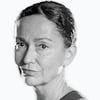Breast cancer expert: ‘Public health is decided at the polls’
Dr. Anna Lluch spoke with EL PAÍS about research funding, cancer screening methods and humanizing the treatment of patients
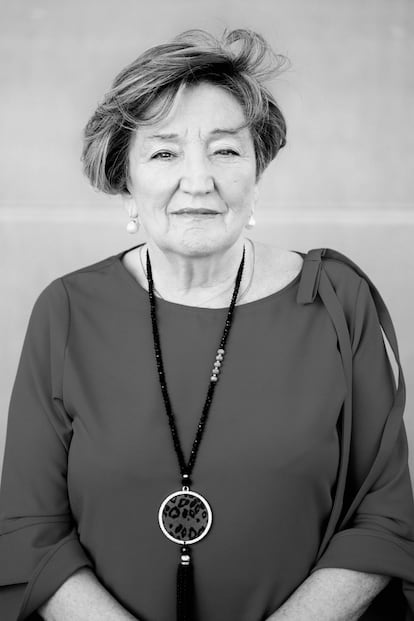
Dr. Anna Lluch arranges to meet EL PAÍS at 9.30am in the Hospital Clinic of Valencia, Spain.
In the waiting room, a young woman exclaims: “Anna!” She and the oncologist embrace. Dr. Lluch is clearly a popular figure.
As the interview begins, she notes that, the older she gets – she’s 73 – the more difficult it is to find the words to adequately express herself.
“I go in circles… eventually, I manage to say what I want to say.”
Question. Do you want to rest a bit before we start?
Answer. No, don’t worry. My husband and I have to catch a flight to Ovieda for a holiday. Once we reach, he’ll cook. He’s a very good cook.
Q. Do you also know how to cook?
A. Yes, I can make a lot of dishes: lentils, baked rice, stew and nougat, with recipes from my mother-in-law. But I don’t have much time to spend in the kitchen.
Q. Don’t you get tired of travelling so much?
A. On the contrary, the trips give me time to reflect and study – especially the long ones.
Q. Does your husband ever accompany you on your work trips?
A. Never.
Q. In 1978, though, he moved in with you in a trailer, next to Lake Como, in Italy.
A. I went to Milan to learn about biopsy procedures for tumors. But my children remember it as an adventure!
Q. Are any of your kids in the medical field?
A. Nope. Vicent makes documentaries. Joan has worked with NGOs in Colombia, Lebanon and Nicaragua. My grandchildren were born all over the world.
Q. Your son directed the TV series Medical Chronicle. He looked at the lives of people working in Spain’s public health system. Alcoholism was a big problem. Does that worry you? Do you drink?
A. Not really. It’s hard for me to take time for myself. I don’t have any form of enjoyment other than my work. Sometimes I’m lazy: in the afternoons, if I don’t have emergencies or emails to answer, I sit around thinking. Maybe I inherited my obsession with work from my parents. My kids call me a Calvinist, because I wouldn’t let them watch TV when they were little.
Q. Did your parents encourage you to study medicine?
A. Not at all. They were working class. My mother said that studying medicine was for people with money: she would turn off the lights when I would be up late studying. I had to put towels under my bedroom door so she wouldn’t see that my lamp was on.
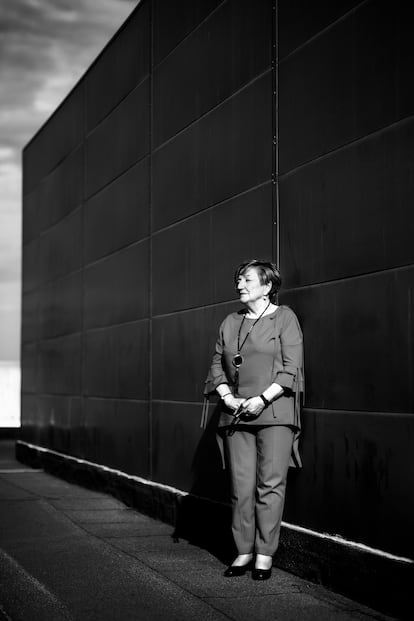
Q. Have you ever done any medical work beyond the field of oncology?
A. Yes. I went to Mozambique for two summers. We realized that breast cancer wasn’t the priority – rather, infectious diseases were a big issue. So, we taught classes in prevention – we would also carry buckets of water and bleach to the hospital to disinfect it.
Q. Given the demands of your profession, have you ever felt like you neglected your children?
A. Sometimes. But they never complained. My husband took really good care of them growing up. And we had holidays that were dedicated to them.
Q. Do you worry about overwork? Is stress a cause of cancer?
A. Stress can produce hormonal alterations… but stress gives me energy. Although I’ve suffered from depression and headaches.
Q. Do you have a personal relationship with cancer?
A. My husband had prostate cancer. He recovered.
Q. What does he do?
A. He’s an agricultural engineer. He’s always been part of a union, doing social activism.
Q. Are you political?
A. Not really. My father was in jail for three years for being a communist… I never got into politics. But my colleagues and I fought for all the hospitals in Spain to be university hospitals, where there could be teaching and research alongside care. That was important.
Q. Why do you think your husband supports you so much?
A. He’s a very secure person… a man with values.
Q. Are you in favor of people wearing ribbons for cancer awareness?
A. The little pink bows or balloons seem silly to me… all the advertising seems to be just another business. But I guess that communication is essential to raising awareness. I’m just not very expressive.
Q. Are you the kind of person who helps a lot, but doesn’t accept help?
A. My husband has scolded me about this. I’ve seen a psychiatrist three or four times to ask for help, to do talk therapy. But it’s hard for me. When I sit there, I feel like I’m taking time away from someone else who may need it more.
Q. You were once a family doctor in Loriguilla, a small town. Do you ever miss that tranquillity?
A. It was when I was pregnant with my second child. I would love to be a village doctor again. Today, in the elevator, I noticed an elderly woman and, for a moment, I thought that I would like to be a general practitioner and make house calls. She wouldn’t need to come here and stand in line.
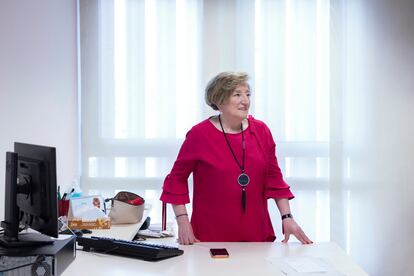
Q. Have you managed to maintain the closeness of a rural doctor with your patients?
A. I have. It’s worth taking your work home with you. It makes you feel alive, more human. You can’t just think about what your patients have – you have to think about how you can help them. That motivates you. When I meet a patient who isn’t doing well, I look at her hands. I think that, in a few days, she may not be there. And I take her hands, I hold them. I keep all the gifts my patients give me – I take them out sometimes. I have embroidery, a handkerchief… sometimes, the gifts are ridiculously valuable, because people are so grateful. I have a safety deposit box in a bank that holds all the things that are worth money. We pay €1,200 [$1,250] a year for it. My husband tells me that we should auction it all off and give the money to cancer research… but I can’t. I’m too attached to the memories.
Q. Do you remember all of the thousands of patients you’ve had in your life?
A. I have a lot of them in my cellphone! They know that I answer based on the urgency of their case.
Q. Do the worst cases take away your happiness?
A. I refuse to tell patients how much time they have left, because I don’t know. Today, we can try up to 10 different chemotherapies. There are new treatments every year. In the breast, tumors of hormonal origin are considered to be very treatable… you just have to take a pill. But it’s a pill that destroys your sex life. Compared to dying, it’s nothing, but it’s still very hard.
Q. A nurse is very important for someone like you, no?
A. Patients need to have direct access to a professional when they’re going into clinical trials. The nurse can prepare them, help them and act as a bridge between the patient and the oncologist. This frees up a doctor to cover more cases.
Q. What do you think about public-private medical systems?
A. The private hospitals always win. Whenever a patient can’t afford all the new drugs they offer, they send them to us [in the public hospitals].
Q. What can be done about this?
A. I guess you can vote for the [political] parties that promise to allocate more money to public healthcare.
Q. In Spain, 37,000 breast cancers are diagnosed each year. That’s a very high number.
A. Yes, but mortality has decreased significantly.
Q. Even so, 15% – about 6,500 patients – die.
A. But now, the average survival time – in the most extreme cases – is nearly 60 months. Three years ago, it was around 18 months.
Q. What does good treatment depend on?
A. The size of the tumor isn’t the most important thing. What is fundamental are the biological attributes that are detected via molecular studies. You can’t just say that a tumor is good or bad… we need to know the attributes of the cells before healing can progress. That’s why I believe that accurate diagnosis is more important than treatment. The small hospitals shouldn’t be doing molecular testing – the big hospitals should handle that. That way, the small hospitals can send the big labs samples and images of the tumors, instead of sending the patients themselves. This would be more efficient.
Q. Are you in favor of registering all tumors in a national system?
A. Absolutely. If we as professionals don’t upload the data into a national registry, we don’t know which tumors are active or where they are occurring. Without this kind of epidemiological information, we’re unable to properly organize healthcare systems.
Q. Why do you think there are hardly any breast cancer cases in Japan?
A. That indicates a relationship between diet and tumors.
Q. Why do so many doctors who are trained here leave Spain?
A. There are too few doctors and too many shifts. People get burned out.
Q. We can’t solve this problem without political will – the state of the public health system is decided at the polls. We’re also failing at technological training… our laboratories need more resources to better serve patients.
A. Have you ever had political problems as an oncologist?
Q. Never. I’ve had to fight some governments to procure new medications… but it’s the same struggle regardless of which party is in power. It should be possible to put health above politics.
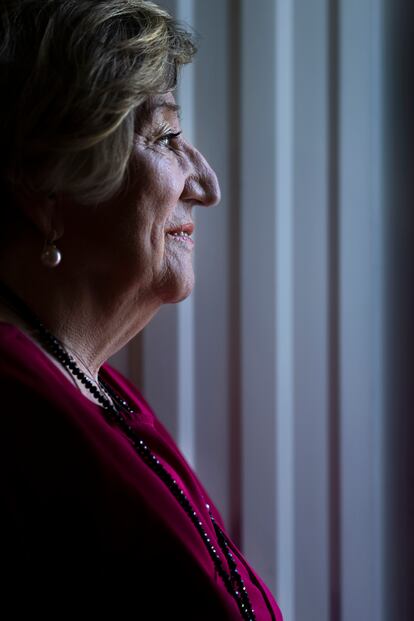
Q. If someone is losing their battle with cancer, should they go to a medical hub, like Houston, for better options?
A. Absolutely not. Treatments from [a medical hub like Houston] can also exist here. I don’t like to perpetuate false cancer myths. I also don’t like to use war terms: you don’t fight cancer – you try to stop it. The new drugs are not missiles: they are accurate cures, the results of research.
Q. Today in Europe, 50,000 cases of breast cancer are diagnosed each year among women who are under the age of 40. What do you propose to better deal with this?
A. We don’t have reliable screening methods for younger women. Their mammary glands are very dense… this makes it difficult for us to see the tumors. We would have to do mammograms, ultrasounds and MRI scans. But even an MRI can detect false positives for breast cancer – there are many mastectomies being done just because a surgeon saw some specks. It’s better for women to learn how to conduct self-examinations. Technology should only be used when it’s really needed.
Q. Is this along the lines of how we’re seeing an excess in C-sections that are unneeded?
A. Exactly!
Q. So more mastectomies are being performed than necessary?
A. What appears in an MRI is sometimes not found. When in doubt, some surgeons opt for mastectomies and prostheses. Remember though, we can also find breast cancer behind prostheses. It’s better to analyze the tumors before jumping to conclusions. And, when a mastectomy is done, the reconstruction should utilize the patient’s own tissues, from the fat of the abdomen or back. There shouldn’t be a reliance on implants – it’s safer to use your own cells.
Q. Did the pandemic result in a lot of late diagnoses?
A. Many people were afraid to come to the hospital. Checkups were certainly neglected.
Q. Which technology could revolutionize cancer treatment?
A. The liquid biopsy can detect a tumor before it appears in a CT scan. It can also check if there are tumor cells in the bloodstream. This significantly advances a cancer diagnosis. It’s the future.
Q. Forbes magazine recently ranked you among the 100 best doctors in the world.
A. Oncology shouldn’t be measured with economic indices…
Q. What’s your relationship with money like?
A. I come from a family with very little money. Whenever I’ve had it, I’ve tried to share it. But there hasn’t been much to share, because I’ve never had a private practice!
Q. How can we – as a society – be more optimistic about dealing with cancer?
A. We have to discard the idea that cancer is equal to death. It’s not. There’s always a seed of goodness in the world. The problem is that we rarely let it grow.
Tu suscripción se está usando en otro dispositivo
¿Quieres añadir otro usuario a tu suscripción?
Si continúas leyendo en este dispositivo, no se podrá leer en el otro.
FlechaTu suscripción se está usando en otro dispositivo y solo puedes acceder a EL PAÍS desde un dispositivo a la vez.
Si quieres compartir tu cuenta, cambia tu suscripción a la modalidad Premium, así podrás añadir otro usuario. Cada uno accederá con su propia cuenta de email, lo que os permitirá personalizar vuestra experiencia en EL PAÍS.
¿Tienes una suscripción de empresa? Accede aquí para contratar más cuentas.
En el caso de no saber quién está usando tu cuenta, te recomendamos cambiar tu contraseña aquí.
Si decides continuar compartiendo tu cuenta, este mensaje se mostrará en tu dispositivo y en el de la otra persona que está usando tu cuenta de forma indefinida, afectando a tu experiencia de lectura. Puedes consultar aquí los términos y condiciones de la suscripción digital.
